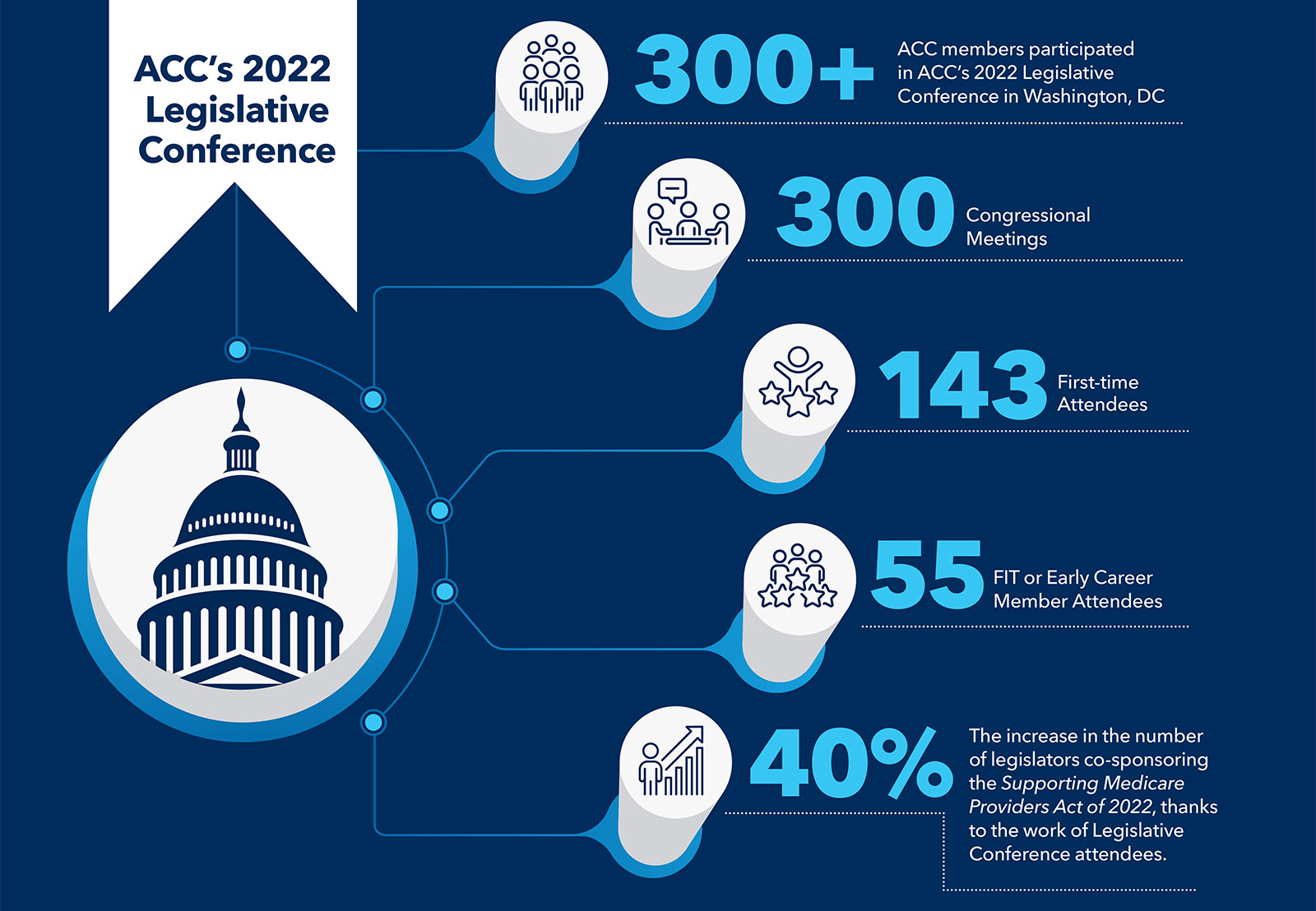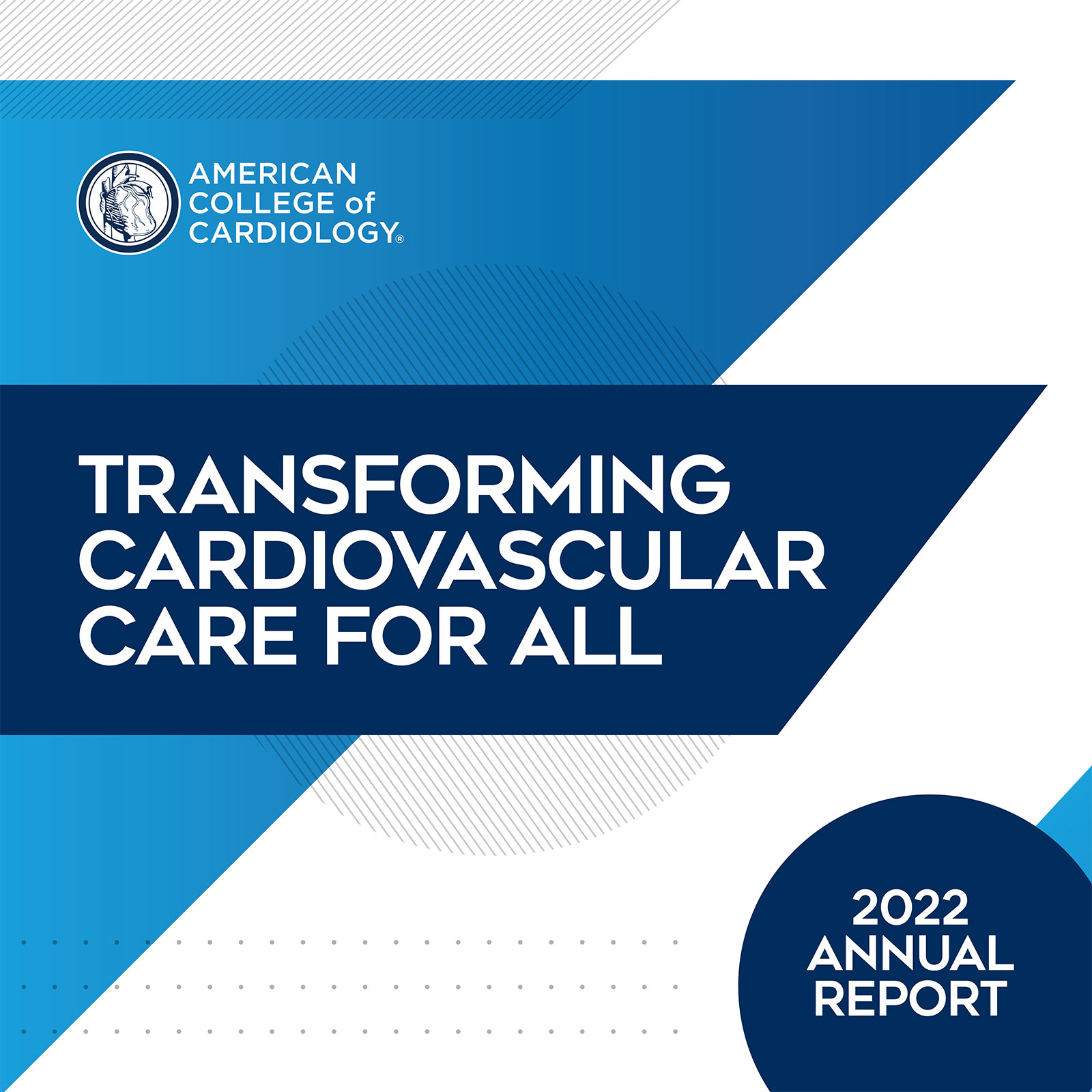We Are Impacting Health Care Policy

From the halls of Congress in Washington, DC, to state houses across the country, ACC Advocacy was hard at work throughout 2022, pushing to advance solutions to optimize the care and outcomes of cardiovascular patients throughout the U.S.



#StopTheCuts
Ongoing cuts to physician payment continue to threaten patient access to care and highlight the importance of broad, long-term reform. ACC's grassroots network sent 3,800+ messages to members of Congress urging action to address the devastating Medicare reimbursement cuts that were set to take effect starting in January 2023. Thanks to the work of those participating in the College's 2022 Legislative Conference, the number of legislators co-sponsoring the Supporting Medicare Providers Act of 2022 increased by 40% heading into the end of 2022. In addition, in the final days leading up to the end of the year and the expiration of government funding on Dec. 23, 2022, Congress passed Omnibus legislation that provided partial relief from the January Medicare reimbursement cuts.

Answering the Grassroots Call
More than 1,000 letters were sent to state lawmakers across the country, advocating on a wide array of issues impacting clinicians and patients, including Certificate of Need repeal, medical malpractice, postpartum Medicaid coverage, and STEMI systems of care.

Making an ImPACt
ACC's HeartPAC distributed $586,500 to congressional candidates in the 2021-2022 election cycle. Of the candidates HeartPAC supported, 93% won their respective elections and 98% of HeartPAC funds were used to support winning campaigns. Learn more at HeartPAC.org.



Championing Value-Based Care
The ACC hosted its fourth annual Value-Based Care in Cardiology Forum at Heart House in November. The day-long event brought together clinicians, payers and others for discussions around marketplace examples of cardiology participation in accountable care models and ways total cost of care models can engage cardiologists through data-sharing, risk-sharing and shared accountability for outcomes. With much of health care being locally driven, these discussions are vital as we work together to navigate challenges and advance best practices.

Heart Health Awareness
The ACC has been a long-time proponent of the South Asian Heart Health Awareness and Research Act (SAHARRA), which would address health equity issues by funding education and awareness initiatives among populations disproportionately affected by cardiovascular disease. This past year saw this important legislation passed in the U.S. House.

Advocacy Wins For Clinicians and Patients
ACC Advocacy efforts resulted in the passage of two key bills tied directly to the College's policy priorities of protecting clinician well-being and ensuring patient access to care. The passage of the Dr. Lorna Breen Health Care Provider Protection Act provides critical funding and support for education, training and additional resources to support the mental health and well-being of health care providers, while passage of the Cardiovascular Advances in Research and Opportunities Legacy (CAROL) Act will ensure important research, education and public health initiatives for valvular heart disease research.

ACC Leading the Way
ACC's Chief Medical Officer Richard J. Kovacs, MD, MACC, testified before the U.S. House Energy and Commerce Committee Health Subcommittee on March 30, 2022, on the importance of the reauthorization of the Medical Device User Fee Act (MDUFA) to prevent any lapse in patient access to care.

Addressing Administrative Burden
ACC continued to prioritize prior authorization reform in state legislatures and at the national level, with several states, including Louisiana, Michigan and Pennsylvania, successfully passing prior authorization legislation thanks to the work of ACC State Chapters and the ACC State Advocacy team. In addition, eight states introduced "Gold Carding" bills – an emerging trend that would exempt specific providers from prior authorization requirements if they have met certain performance measures.
Nationally, the House of Representatives in September passed the ACC-backed Improving Seniors' Timely Access to Care Act, which would minimize administrative burden by streamlining prior authorizations for Medicare Advantage patients while increasing process transparency. Companion legislation has nearly 50 co-sponsors in the Senate. Leading up to the end of the year, the Centers for Medicare and Medicaid Services (CMS) released a proposed rule that closely follows the provisions in the House-passed bill and would improve interoperability and prior authorizations in Medicare Advantage and other programs through the adoption of e-prior authorization programs.

Partnering to Drive Change
The ACC, in collaboration with partner societies like the Heart Rhythm Society, worked nonstop to address proposed Medicare reimbursement cuts included in the 2023 Medicare Physician Fee Schedule. Between high-level meetings with CMS staff and lawmakers, as well as public comments and grassroots action, the College was able to successfully mitigate and partially claw back additional cuts for ablation services.
